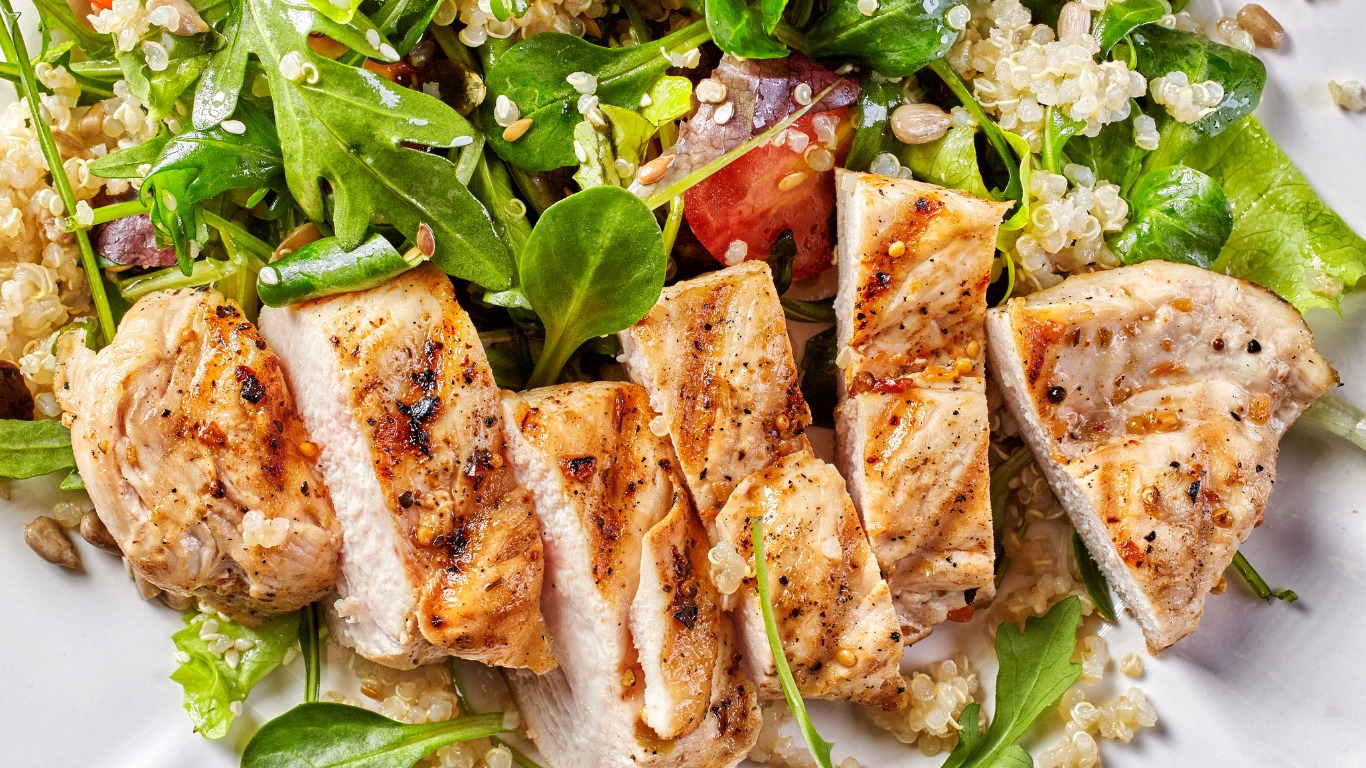Disclosure:
Thank you for reading this post, don't forget to subscribe!
Some of the links on this website are affiliate links. This means that if you click on the link and make a purchase, we may receive a small commission at no extra cost to you. Your support helps us keep the site running.Learn more on my Privacy Policy and Affiliate Disclosure page. Thank you for your support!

In a world where dietary choices are as varied as they are plentiful, the gluten-free diet has emerged as one of the most popular health trends of recent years. What was once a necessary adjustment for those with celiac disease has now become a mainstream choice for many seeking improved health and well-being. But what are the real benefits of a gluten-free diet, and why should you consider making this change? This guide dives deep into the numerous advantages, potential drawbacks, and practical tips for adopting a gluten-free lifestyle.
Understanding Gluten: What Is It and Where Is It Found?
Before exploring the benefits, it’s essential to understand what gluten is and where it can be found. Gluten is a group of proteins found in wheat, barley, and rye. It acts as a binding agent, giving bread and other baked goods their chewy texture. Common sources of gluten include:
- Bread and baked goods: Most traditional bread, cakes, and pastries contain gluten.
- Pasta: Unless labeled as gluten-free, most pasta products contain gluten.
- Cereals: Many cereals, especially those made from wheat or barley, are gluten-containing.
- Processed foods: Gluten is often used as a thickener or filler in processed foods like sauces, soups, and snacks.
read more about: The Keto Diet: Is It Right for You? A Comprehensive Guide.
Who Should Consider a Gluten-Free Diet?
The most well-known reason for adopting a gluten-free diet is celiac disease, an autoimmune disorder where the ingestion of gluten leads to damage in the small intestine. However, even individuals without celiac disease may benefit from going gluten-free, particularly those with non-celiac gluten sensitivity or wheat allergy. Recent studies also show that a growing number of people are choosing a gluten-free diet as a way to improve their overall health, even in the absence of diagnosed gluten-related disorders.
Health Benefits of a Gluten-Free Diet
The benefits of a gluten-free diet extend beyond those with specific gluten-related conditions. Here are some of the most significant advantages:
Alleviating Digestive Issues
One of the most immediate benefits many people experience on a gluten-free diet is relief from digestive problems. Gluten can cause inflammation in the gut, leading to symptoms like bloating, diarrhea, and gas. By removing gluten from the diet, many individuals report a noticeable improvement in these symptoms, leading to better overall digestive health.
learn more about: Gluten-Free Diet: Is It Right for Me?
Enhancing Nutrient Absorption
For those with celiac disease, gluten can damage the lining of the small intestine, leading to poor nutrient absorption and deficiencies in vitamins and minerals. A gluten-free diet helps to heal the gut, allowing the body to absorb nutrients more effectively. Even for those without celiac disease, reducing gluten can improve gut health and enhance nutrient absorption.
Reducing Chronic Inflammation
Chronic inflammation is at the root of many serious health conditions, including heart disease, diabetes, and certain cancers. Gluten has been shown to contribute to inflammation in some individuals, particularly those with autoimmune disorders. By eliminating gluten, many people experience a reduction in inflammatory markers, which can have a positive impact on overall health.
Improved Energy Levels and Mental Clarity
Many people report increased energy and mental clarity after switching to a gluten-free diet. This could be due to the reduction in digestive distress and inflammation, both of which can sap energy and cloud thinking. For those who have struggled with fatigue and “brain fog,” going gluten-free can lead to a significant improvement in quality of life.
find out more about: The Gluten-Free Diet for Celiac Disease and Beyond-PubMed national library of medicine.
Skin Health Improvements
Skin conditions like eczema, psoriasis, and dermatitis herpetiformis (a skin manifestation of celiac disease) have been linked to gluten sensitivity. A gluten-free diet can lead to clearer skin and a reduction in these skin issues, offering a tangible benefit to those who struggle with chronic skin conditions.
read next:
Potential Drawbacks and Considerations
While the benefits are compelling, it’s also important to consider the potential drawbacks of a gluten-free diet. These can include:
The Risk of Nutritional Deficiencies
Gluten-containing grains are a source of important nutrients, including fiber, iron, and B vitamins. When these grains are removed from the diet, it’s essential to find alternative sources of these nutrients to avoid deficiencies. This is particularly important for those who do not carefully plan their gluten-free diet.
The Challenge of Finding Gluten-Free Alternatives
While the market for gluten-free products has grown significantly, finding gluten-free alternatives that match the taste and texture of traditional foods can still be challenging. Many gluten-free products are more expensive and may not be as readily available, making meal planning more difficult for those on a budget.
Social and Lifestyle Adjustments
Eating gluten-free requires a heightened awareness of what is in your food, which can be challenging in social settings. Dining out, attending events, or even sharing meals with friends can become more complicated, as there is always a risk of cross-contamination with gluten-containing foods
Gluten-Free Diet and Weight Loss: A Realistic Expectation
One of the misconceptions about gluten-free diets is that they automatically lead to weight loss. While some people do lose weight after cutting out gluten, it’s often because they are eating fewer processed foods and more whole foods. However, many gluten-free products are high in sugar and fat, which can lead to weight gain if consumed in excess. It’s important to focus on a balanced diet rather than relying solely on gluten-free labels for weight management.
Adopting a Gluten-Free Lifestyle: Practical Tips

Transitioning to a gluten-free lifestyle can be daunting, but with the right strategies, it can be done smoothly and successfully.
check out: Gluten-Free Foods-celiac disease foundation.
Reading Labels and Understanding Ingredients
One of the most important skills you will need to develop is reading labels. Gluten can hide in many places, from sauces and dressings to processed meats. Look for labels that specifically state “gluten-free,” and be aware of ingredients like malt, hydrolyzed vegetable protein, and modified food starch, which may contain gluten.
Meal Planning and Preparation
Planning your meals ahead of time is key to maintaining a gluten-free diet. Focus on naturally gluten-free foods like fruits, vegetables, lean proteins, and gluten-free grains such as rice, quinoa, and millet. Preparing meals in advance can help you avoid the temptation of gluten-containing convenience foods.
Dining Out and Social Situations
Navigating menus in restaurants can be tricky, but many establishments now offer gluten-free options. Don’t hesitate to ask questions about how food is prepared to avoid cross-contamination. In social situations, it can be helpful to bring your own gluten-free dish or snack to ensure you have something safe to eat.
explore more:
Gluten-Free Diet and Mental Health
The connection between diet and mental health is increasingly recognized, and a gluten-free diet can play a role in improving mental well-being. Some studies suggest that gluten can contribute to mood disorders, including anxiety and depression, particularly in those with gluten sensitivity. By removing gluten, individuals may experience a reduction in symptoms and an improvement in overall mood.
Further Reading: Why Grains Are Unhealthy-The question of whether grains are truly essential or potentially harmful?
Gluten-Free Diets for Children
For children with celiac disease or gluten sensitivity, following a gluten-free diet is essential for their health. However, managing a gluten-free diet for kids can be challenging, especially if they are picky eaters. It’s important to find gluten-free foods that your child enjoys and to educate them about the importance of avoiding gluten. Schools and daycare centers should also be informed about your child’s dietary needs to ensure they have safe food options.
Common Myths About Gluten-Free Diets
There are many myths surrounding gluten-free diets that can lead to confusion. For example, some people believe that a gluten-free diet is inherently healthier, but this is not always the case. Gluten-free products can still be highly processed and contain unhealthy ingredients. Another common myth is that everyone should avoid gluten, but this is only necessary for those with specific gluten-related health conditions.
Success Stories and Testimonials
Hearing from others who have successfully adopted a gluten-free diet can be incredibly motivating. Many people have shared their stories of how going gluten-free has improved their health, from alleviating chronic digestive issues to increasing energy levels and improving mental clarity. Nutritionists and dietitians also offer valuable insights into how a gluten-free diet can be part of a healthy lifestyle.
The Future of Gluten-Free Diets
The gluten-free market continues to grow, with more products and better alternatives becoming available. As research into gluten sensitivity and its effects on health progresses, we can expect to see even more innovations in gluten-free foods. The trend towards gluten-free living is likely to continue, driven by both necessity and a growing awareness of the benefits.
FAQs
What are the signs that I might need to go gluten-free?
If you experience chronic digestive issues, fatigue, or skin problems, it may be worth exploring whether gluten could be a trigger. Consulting with a healthcare provider and undergoing proper testing is essential before making any dietary changes.
Can I get enough fiber on a gluten-free diet?
Yes, you can still get plenty of fiber on a gluten-free diet by incorporating foods like fruits, vegetables, legumes, and gluten-free whole grains such as quinoa and brown rice.
How do I avoid cross-contamination when cooking gluten-free?
Use separate utensils, cookware, and cutting boards for gluten-free foods. Thoroughly clean surfaces and hands after handling gluten-containing products to prevent cross-contamination.
Are gluten-free diets safe for everyone?
While gluten-free diets are essential for those with celiac disease or gluten sensitivity, they are not necessarily beneficial for everyone. It’s important to consult with a healthcare provider before making significant dietary changes.
Do gluten-free foods taste different?
Some gluten-free foods may have a different taste or texture, but with the growing availability of high-quality gluten-free products, the differences are often minimal.
Is it necessary to follow a gluten-free diet if I don’t have celiac disease?
Not necessarily. While some people may feel better without gluten, it’s important to ensure that your diet remains balanced and nutritious. If you suspect gluten may be affecting your health, consult with a healthcare professional for guidance.
Conclusion
In summary, the benefits of a gluten-free diet can be significant, particularly for those with celiac disease, gluten sensitivity, or related health conditions. From improved digestion and nutrient absorption to enhanced energy and mental clarity, the advantages are clear. However, it’s important to approach a gluten-free diet with careful planning to avoid potential pitfalls like nutritional deficiencies and social challenges. If you’re considering making the switch, take it step by step, and consult with a healthcare professional to ensure it’s the right choice for you.
more about:
HEALTH / WELNESS / FITNESS / NUTRITION
SHARE this article












